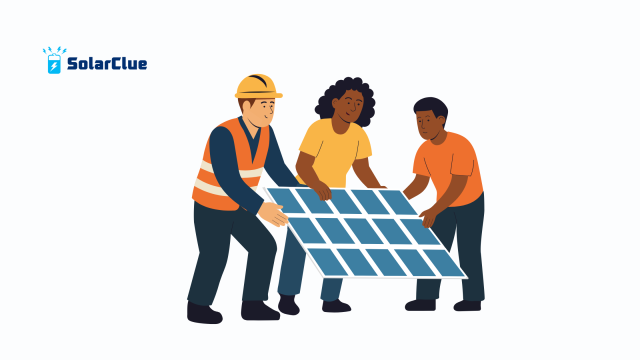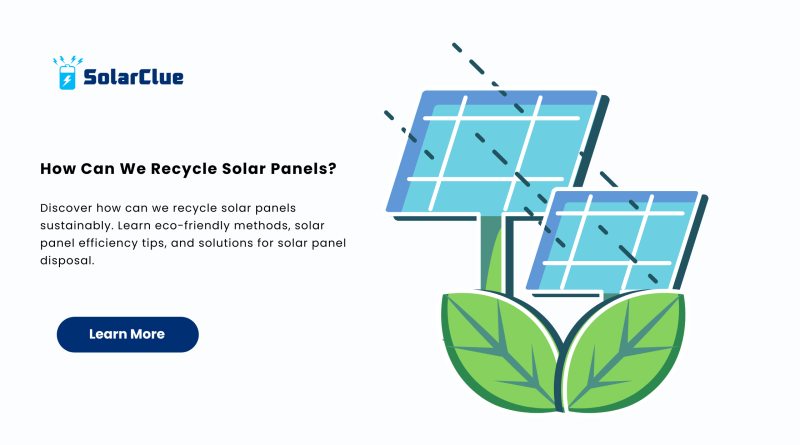How Can We Recycle Solar Panels?
As the world moves towards renewable energy, solar panels have become increasingly popular. Yet with a typical lifespan of 25–30 years, it’s crucial to answer an important question: how can we recycle solar panels sustainably? Millions of panels will soon reach retirement, and handling them responsibly can make a huge environmental difference. In this guide, you’ll discover why recycling matters, how it works, and how you can actively participate in creating a greener future.
Table of Contents
- 1 Why Recycling Solar Panels Is Important
- 2 Understanding the Components of a Solar Panel
- 3 How Can We Recycle Solar Panels: Step-by-Step Process
- 4 Challenges in Recycling Solar Panels
- 5 Latest Innovations in Solar Panel Recycling
- 6 How Recycling Improves Solar Panel Efficiency
- 7 Choosing the Best Solar Panels for Your Home
- 8 Eco-Friendly Disposal Methods Beyond Recycling
- 9 Government Regulations on Solar Panel Recycling
- 10 How Homeowners Can Support Solar Panel Recycling
- 11 Conclusion: Building a Greener Future Through Recycling
- 12 FAQs About Recycling Solar Panels
Why Recycling Solar Panels Is Important
Environmental Impact of Solar Panel Waste
As more homeowners install solar panels for home use, we must also deal with the waste they generate. Discarded panels, if left unmanaged, can leak hazardous substances like lead or cadmium into the environment. Recycling provides a clear path to prevent pollution, conserve valuable resources, and strengthen the renewable energy cycle.
Extending Solar Panel Efficiency Through Recycling
By recycling, we give critical materials a second life, which helps boost solar panel efficiency for future production. When manufacturers reuse precious elements, they create the best solar panels more sustainably, saving energy and resources.
Understanding the Components of a Solar Panel
Key Materials Used in Solar Panels
Each solar panel includes silicon, aluminum, glass, silver, and plastics. These components contribute to a panel’s strength and performance. By reclaiming these materials, recyclers can help reduce the need for new raw material extraction.
How These Materials Affect Recycling Methods
Different materials require specialized recycling techniques. For example, companies easily recycle aluminum frames, while delicate silicon wafers demand careful handling to preserve their properties for reuse.
How Can We Recycle Solar Panels: Step-by-Step Process
Collection and Transportation
Recycling begins with proper collection and transportation of used solar panels. Certified recyclers manage this process carefully, ensuring that panels remain intact to maximize the amount of material that can be recovered.
Dismantling and Material Recovery
Recyclers manually remove the aluminum frames and junction boxes from each panel. They then separate the glass, which forms most of the panel’s weight. Workers handle delicate materials with precision, recovering valuable metals like silver and silicon.
Processing and Reuse in New Products
After separation, companies process these materials using thermal, chemical, or mechanical methods. They reuse the recovered components to manufacture new solar panels, electronics, or even batteries, thus closing the loop of resource consumption.
Challenges in Recycling Solar Panels
Technological Barriers
Despite major advances, recycling solar panels still presents challenges. Their tough, weather-resistant design makes them difficult to dismantle without damaging key components.
Economic Considerations
Today, recycling costs often exceed the value of recovered materials. However, growing demand for rare resources and better technology continues to make solar panel recycling more economically viable.
Latest Innovations in Solar Panel Recycling
Breakthroughs in Material Separation
Innovators have introduced new chemical and mechanical separation techniques that recover higher percentages of materials from solar panels. These methods reduce waste and increase the purity of extracted elements.
Advancements in Recycling Techniques
Laser separation and bio-leaching processes are changing the recycling landscape. These new techniques lower energy use and decrease the environmental footprint, making recycling the best solar panels for your home more practical than ever.
How Recycling Improves Solar Panel Efficiency

Recovering Valuable Materials
Through effective recycling, manufacturers recover precious materials like silver and high-purity silicon. Reusing these elements in new solar panels saves both energy and money, while also improving overall panel performance.
Reducing Manufacturing Energy Costs
Manufacturers who rely on recycled materials reduce the energy required to make new panels. This efficiency directly contributes to cleaner production lines and a smaller carbon footprint.
For sustainable energy solutions and to explore the best solar panels, visit SolarClue where quality meets responsibility.
Choosing the Best Solar Panels for Your Home
Key Features of the Best Solar Panels
When choosing the best solar panels for your home, prioritize factors like efficiency, durability, warranty terms, and sustainability. Panels designed with recyclability in mind tend to perform better and last longer.
How Recyclability Affects Your Choice
Selecting recyclable solar panels ensures that you minimize environmental impact even when panels reach the end of their life. Eco-conscious brands usually offer products with higher solar panel efficiency and longer warranties, providing greater value over time.
Stay updated with in-depth guides at blog.solarclue.com to make the most informed solar investment.
Eco-Friendly Disposal Methods Beyond Recycling
Repurposing Solar Panels for Alternative Uses
Instead of recycling, you can also repurpose old solar panels for off-grid applications like powering small cabins, sheds, or RVs. This approach extends their life and reduces waste.
Donating Old Solar Panels
Charitable organizations accept functional old solar panels and refurbish them for community projects. Donation not only extends a panel’s usefulness but also benefits those who need affordable energy solutions.
Government Regulations on Solar Panel Recycling
International Recycling Standards
Governments worldwide have started regulating solar panel disposal. For instance, the European Union enforces the WEEE Directive, which mandates recycling for all photovoltaic equipment.
Policies Supporting Eco-Friendly Solar Panel Use
Many governments now offer incentives that encourage not just solar adoption but also responsible recycling. These policies ensure the solar industry stays sustainable from beginning to end.
How Homeowners Can Support Solar Panel Recycling
Partnering with Certified Recyclers
You can make a difference by working with certified recycling centers that specialize in solar panels. These centers use the best practices to recover materials and minimize harm to the environment.
Making Sustainable Choices from the Start
Support brands that design recyclable solar panels and prioritize transparency about their environmental impact. Being mindful from the very start ensures a full lifecycle approach to sustainability.
Conclusion: Building a Greener Future Through Recycling
Answering the question of how can we recycle solar panels involves understanding, action, and commitment. By recycling, we reduce waste, recover valuable materials, and contribute to a greener world. Every choice we make today affects tomorrow’s environment. Choose responsibly, recycle diligently, and support a clean energy future.
For premium eco-friendly solar solutions, don’t forget to explore solarclue.com and enjoy more solar wisdom at blog.solarclue.com — your trusted source for everything solar!
FAQs About Recycling Solar Panels
1. Can solar panels be fully recycled?
Most solar panels can be recycled up to 95% depending on their materials and recycling technologies.
2. Why should we recycle solar panels?
Recycling prevents toxic waste, conserves raw materials, and promotes sustainable manufacturing.
3. How much does solar panel recycling cost?
Currently, recycling can cost more than dumping, but improved techniques are reducing expenses.
4. What should I do with old solar panels?
Partner with a certified recycling facility or consider repurposing or donating your panels.
5. Are there regulations for solar panel recycling?
Yes, many countries have introduced laws that mandate proper disposal and recycling of solar panels.




